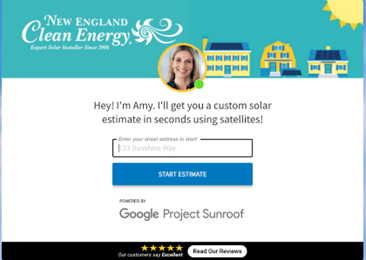Solar Financing
Understanding Solar Financing: Loans vs. Leases
Solar energy is a sustainable and increasingly popular way to power homes and businesses. However, the upfront costs of solar panel installations can be significant. To address this, many companies, including New England Clean Energy, can introduce you to various financing options to make solar energy accessible. Among the most common financing methods are solar loans and solar leases (or Power Purchase Agreements – PPAs).
At New England Clean Energy, we have a variety of financing partners with different options to help you find the best offer for your needs. These options include loans and leases, and power purchase agreements (PPAs) for commercial systems only. Our team can help you explore the best financing option for your needs (whether you are installing solar on your home or business) and guide you through the process. For more information, please call us at 800-886-8867 or sign up for an initial conversation here.
Here’s a breakdown of the value, advantages, and disadvantages of each, helping you decide which might be the best choice for your situation.
Solar Loans
A solar loan allows homeowners to finance the purchase and installation of their solar panel system. The homeowner owns the system outright, which means they can benefit from all available tax credits, rebates, and incentives. NECE offers loans for homeowners. Business owners should consider lease and PPA options.
Advantages:
- Ownership: You own the system, which can increase the value of your property.
- Financial Incentives: You’re eligible for federal tax credits, state incentives, and Solar Renewable Energy Certificates (SRECs) income.
- Long-term Savings: Although you pay upfront via the loan, the long-term savings on electricity can be significant.
- Loans of Various Terms and Rates: Loans are generally available with multiple terms, generally from 5 to 25 years at different rates depending on your personal FICO scores. Better, most loans today can be paid off early or even amortized after partial payments. They also generally include ways to maximize the use of the investment tax credit to minimize the amount of interest you will ultimately pay.
Disadvantages:
- Upfront Costs: Not all loans will cover 100% of the costs, so some customers may need to make an initial investment.
- Maintenance Responsibility: As the owner, you’re responsible for maintenance, though solar systems require minimal upkeep.
This is the best option for those who prefer ownership to maximize long-term financial benefits and are comfortable taking on the maintenance responsibilities of their system.
Solar Leases/PPAs
With a solar lease or PPA, you do not own the solar panel system. Instead, a third party does, and you pay a fixed monthly rate to “rent” the system or purchase the power it produces, often at a lower rate than your local utility.
Advantages:
- No or Low Upfront Costs: Solar leases often require no upfront payment, making solar accessible without a significant initial investment.
- No Maintenance Concerns: The leasing company is responsible for maintenance and repairs, reducing the hassle for the business owner.
- Immediate Savings: Your business or non-profit can start saving on your electricity bills immediately without waiting for payback over time.
Disadvantages:
- No Financial Incentives: You’re not eligible for tax credits or incentives since you don’t own the system. As such your potential financial return is greatly reduced.
- Payments May Not Be Fixed: You pay a monthly lease payment or power purchase amount, but it might not be fixed. Many solar PPAs have a cost “accelerator” built into the agreement. As a result, the amount you pay may increase over time, along with the standard utility rate.
- It Is Hard to Get Out of Most Leases: A lease or PPA is normally structured to last 15 to 20 years. If you wish to sell the property before the end of the lease it may be difficult to get out of it – or even transfer it to the new owner. And when you can, the cost may represent a significantly large portion of the system’s original price.
- The Leasing Company May Go Out of Business: While a lease allows you to leave the management and maintenance of your system up to the leasing or PPA company, it is not totally uncommon for them to go out of business in the constantly changing world of solar. Conversely, if you own your system and your installer goes out of business you can always get assistance from another installer willing to do service work on systems they did not originally install (such as New England Clean Energy).
Leases and PPAs are an option only for commercial or non-profit businesses. More of the financial benefits of solar are passed on to business customers and many of them are structured to give the business full ownership after a reasonable period of time; generally 7 to 15 years.
Which to Choose?
The choice between a solar loan and a lease depends on whether the installation is residential or commercial, your financial situation, long-term energy goals, and personal preferences regarding system ownership and maintenance.
- If maximizing financial returns and increasing home value is important, and you’re willing to handle or outsource the generally minimal need for maintenance, a solar loan might be the better choice.
- If immediate savings with no upfront costs and a maintenance-free approach are more appealing, a solar lease/PPA could suit you better.
Regardless of the path you choose, going solar is a step toward sustainable living and can provide significant savings and environmental benefits over time.
Have Questions about How You Can Finance Solar For Your Home or Business??
New England Clean Energy is all about making it easy for you to get started and we offer several different ways to find out what types of savings might be available for you!
You can talk to Our Experts at 877-886-8867
or Get a Ballpark Estimate using our AI-driven estimation tool.


